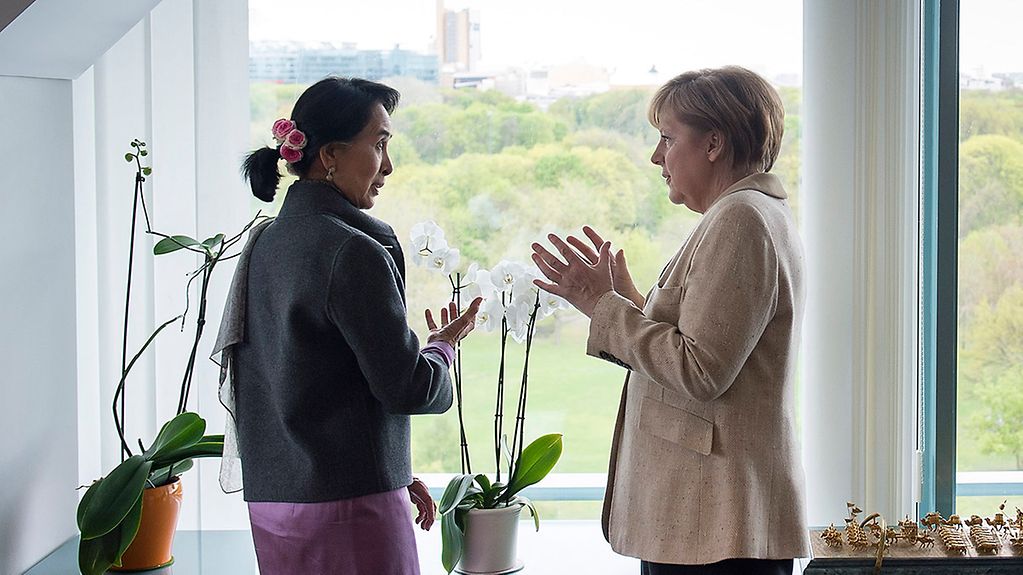Germany/Myanmar
Chancellor Angela Merkel and Myanmar’s opposition leader, Aung San Suu Kyi, have met for the first time. In Berlin the Chancellor praised Aung San Suu Kyi’s unwavering stance on liberty, democracy and human rights. In spite of the many threats she has faced, the Nobel Peace Laureate has stuck to her ideals.
2 min reading time

Chancellor Angela Merkel and Nobel Peace Laureate Aung San Suu Kyi meet for the first time.
Photo: Bundesregierung/Bergmann
Aung San Suu Kyi is currently visiting Germany. Federal President Joachim Gauck invited her to Germany during his visit to Myanmar in February. Her first stop was a meeting with the Federal President at Schloss Bellevue.
First face to face meeting
Later, the Chancellor welcomed Myanmar’s opposition leader to the Federal Chancellery. "Over the years we have spoken often by telephone," said Angela Merkel. But this was the first time the two politicians had actually met.
"I am delighted to welcome a lady, who like few others in the world has demonstrated incredible courage in her fight for liberty, democracy and human rights," said the Chancellor. Aung San Suu Kyi has spent an incredible length of time under house arrest, and has nevertheless remained faithful to her ideals and convictions.
Video
Germany offers assistance
Angela Merkel was delighted, "that, in spite of this difficult time, Aung San Suu Kyi has now decided to play an outstanding political role in the transformation of her country, to do her bit, and to shape the political arena." This is incredibly important for Myanmar and the people in her country, said the Chancellor.
In her talks with Aung San Suu Kyi, Angela Merkel discussed political developments in Myanmar, and "how we in Germany can help".
After the meeting with the Chancellor, Aung San Suu Kyi also met with Federal Foreign Minister Frank-Walter Steinmeier, Federal Development Minister Gerd Müller and Bundestag President Norbert Lammert.
Aung San Suu Kyi heads Myanmar’s main opposition party. In 1991 she won the Nobel Peace Prize. As leader of the National League for Democracy (NLD) she has been campaigning tirelessly for decades for the democratisation of her country. She has paid for her courage and dedication with almost 15 years under house arrest.
After her release in 2010 and with the opening of her country since 2011, Aung San Suu Kyi has been able to relaunch her political engagement. She stood for election at the 2012 by-elections; her party then entered parliament.
Aung San Suu Kyi intends to stand for election in the presidential elections in 2015. She is currently barred, however, by a clause in the constitution which bans individuals with foreign children from becoming president. Aung San Suu Kyi’s British husband died at the end of the 1990s; her two sons hold British passports. The opposition is endeavouring to have this clause deleted from the constitution.